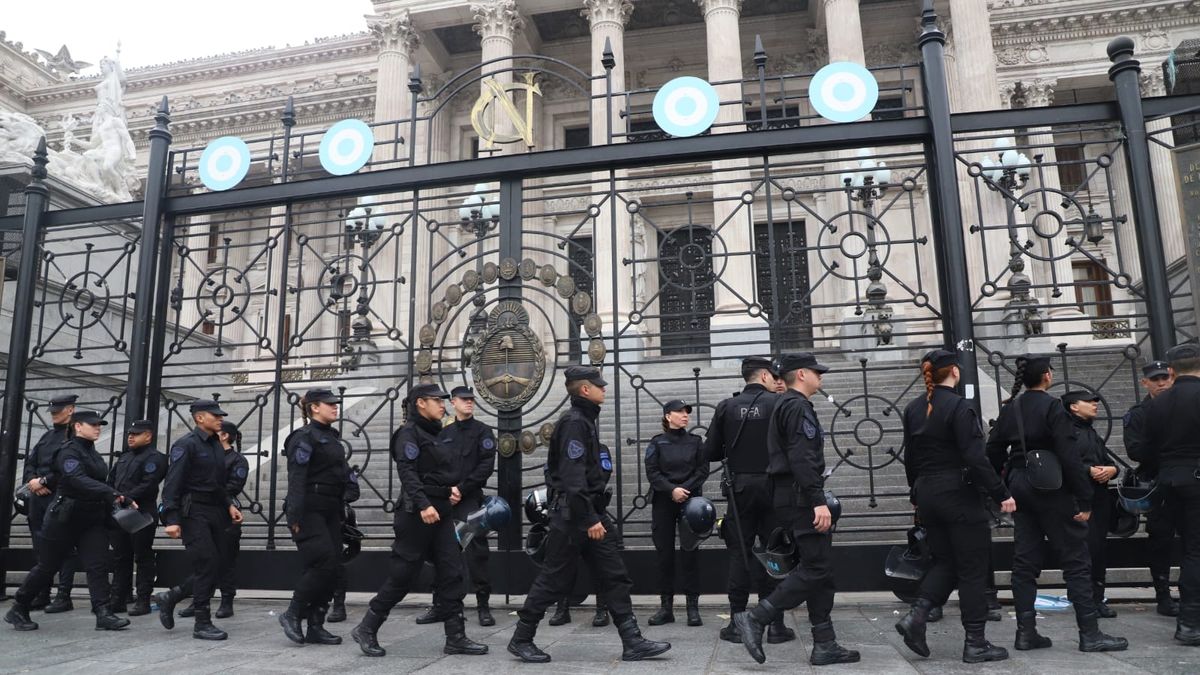Finally the Senate of the Nation approved in general and in particular the Bases law and the tax package, in a day of tension inside and outside Congress. The Government had to agree to changes for the package of measures to come out and, after a tie of 36 votes, the vice president Victoria Villarruel was the one who defined suffrage in the Upper House.
He Country of Spain reflected the triumph of the Argentine ruling party and assured that “The rule advances regulatory bodies, enables privatizations and promotes tax benefits to large investors“. According to the Spanish media, to the national government “approval cost him dearly“.
The country Spain.jpg
For the Spanish media, Milei’s bill is a “dismantling of the State.”
The Country Spain
“The president’s ambition to privatize more than 40 state companies had already been pruned in Deputies and the Senate reduced the list even further,” they stated in the newspaper. Finally, the media also echoed the approval of the delegation of legislative powers to Javier Milei: “Villarruel also had to break the tie to approve the delegation of legislative powers to the President and the declaration of emergencies in administrative, economic, financial and energy matters for one year.”
For its part, the newspaper The UK Guardian covered what happened and assured that the approval of the law gives him a “initial victory for Javier Milei, who established an agenda of radical economic deregulation“. Furthermore, the British media assured that “ foreign investors and the International Monetary FundThey were closely watching whether Milei could reach a consensus with his opponents. to fulfill your ambitions“.
image.png

The British newspaper described the protests in the vicinity of Congress as “violent.”
Guardian
Returning to the continent, the news also had its repercussions in Uruguay. The newspaper El País defined the vote as “electrifying“and focused on the approval of the powers delegated to Javier Milei.
The role of Vice President Villarruel was highlighted by the newspaper since she was the responsible for breaking the tie vote. Furthermore, the newspaper stated that “To achieve the desired objective, the ruling party’s negotiators had to make numerous concessionssuch as the elimination of Aerolíneas Argentinas, Correo and the public media of Radio and Television Argentina (RTA).”
THE COUNTRY URUGUAY.jpg
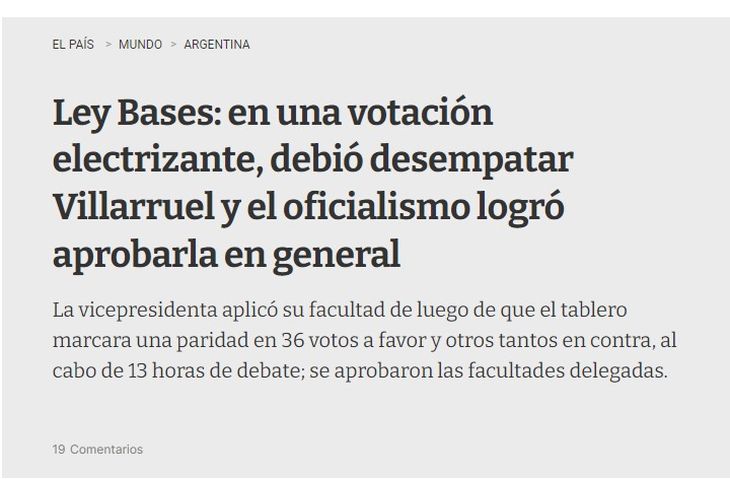
The Uruguayan newspaper highlighted in its article the role of Vice President Victoria Villarruel.
The Country Uruguay
What happened also generated repercussions in Brazil, where the O Globo newspaper published a note where he highlighted that the vote was marked by confrontations in the streets. From the newspaper they reflected that “the Argentine Senate approved, on Wednesday night, the basic text of the reform package proposed by President Javier Milei, known as the Bases Law, that brings bold plans to reform the State“.
Once again, the media highlighted the role played by Victoria Villarruel: “shortly after the second vote, Milei’s vice president began to cast her voteamid protests from opponents who wanted a new round of debates to be opened, as stipulated in the House code, but they were not attended to.
Finally, the newspaper El Universal of Mexico quickly published the result of the general vote and titled the Bases Law as the “star project of the Milei government“. The Mexican media echoed the marathon session and assured that The day was “historical”.
El Universal méxic.jpg
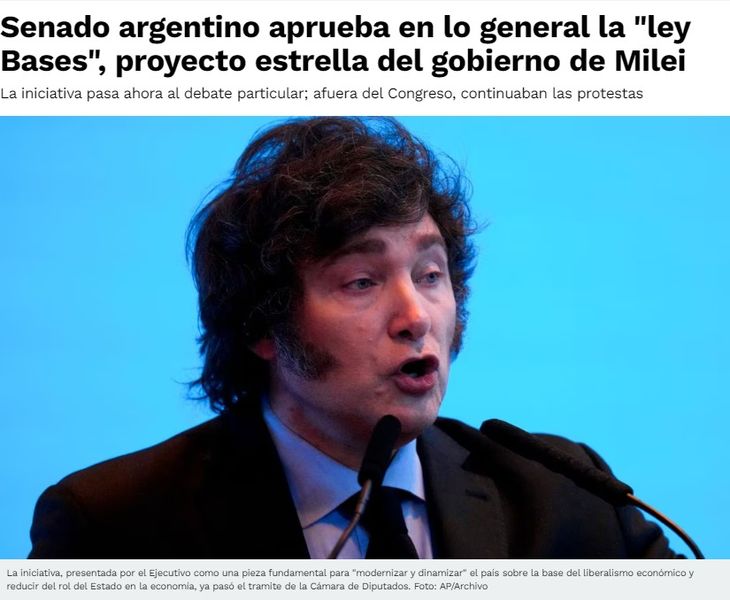
The Mexican newspaper quickly echoed the general approval.
The universal
The repercussions of the international press to the conflict outside Congress
The vote within the National Congress It was not the only highlight of the historic day. Different international media also echoed what happened in the outside the Argentine legislative buildingwhere moments of maximum tension occurred due to the confrontation between the security forces and the protesters.
The newspaper The Country of Spain I dedicate one whole note to reflect the confrontation in the vicinity of Congress. The newspaper stated that “Argentina has a long tradition of resistance in the streets to the most controversial laws” and stated that “the project that gives ultra Javier Milei tools to scrap the state has not been an exception.”
Repression the country.jpg
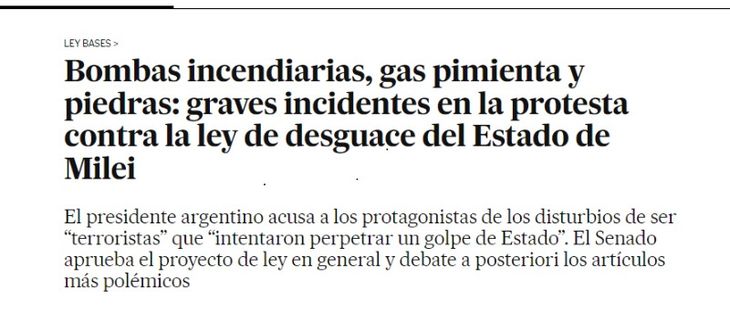
The Spanish newspaper El País dedicated an entire article to the clashes that took place in the streets.
The Country Spain
Along these lines, Javier Milei’s statements about the protests generated repercussions in the Spanish media, which echoed the statements: “the Argentine president accused the protagonists of the riots of being ‘terrorists’ who ‘tried to carry out a coup d’état attacking the normal functioning of the Argentine National Congress.
He Country of Uruguay qualification “piquetero fury in the Argentine Congress against the Milei Bases Law“and assured that what happened outside the legislative building was”the most serious episode of political violence since Javier Milei’s government took office“. For the Uruguayan media, “the Congress area yesterday became a open field of confrontation between leftist protesters and the Federal Police“.
“The anti-picketing protocol proved effective in clearing the vicinity of the building“, they explained in the newspaper of the neighboring country. Finally, the media also echoed what was said by the Argentine president who stated that it should not be ruled out that the opposition uses the “methodology of throwing dead people in the street” during an exhibition at the Hilton Hotel.
El País uruguay protests.jpg
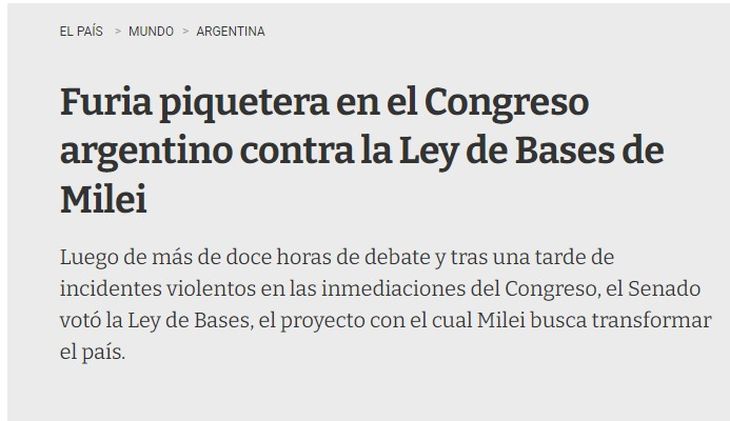
From Uruguay they described the demonstrations that took place outside Congress as “piquetero fury.”
The Country Uruguay
From the other side of the pond, the British newspaper The Guardian He also reported on what happened on the streets. The newspaper stated that “Police used pepper spray, water cannons and tear gas against the large crowd while protesters set two overturned cars on fire and threw Molotov cocktails.”
In its note, the newspaper O Globo dedicated a section to the “clashes” and the “cars on fire“. The Brazilian media stated that “bombs and Molotov cocktails were thrown” and reported that “five deputies who participated in the event were hospitalized“.
O Globo protests.jpg

The newspaper O Globo focused on the actions of the Argentine security forces.
Or Globe
In addition, O Globo focused on the maneuvers of the Argentine security forces: “The police also used dyed water to identify the accused people to carry out attacks. At the beginning of the night, the authorities They arrested 30 people “.
Source: Ambito

